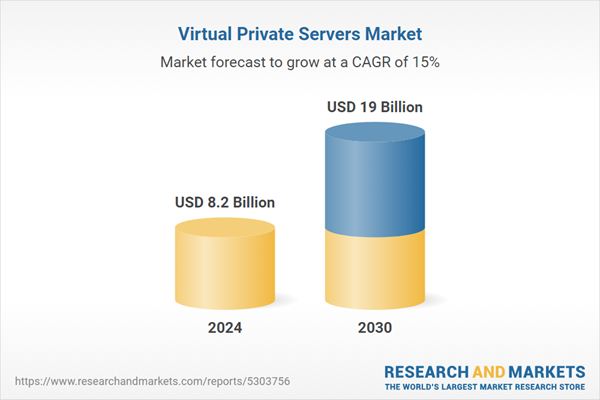Global Virtual Private Servers (VPS) Market - Key Trends & Drivers Summarized
What Are Virtual Private Servers (VPS), and Why Are They So Crucial in Modern IT Solutions?
Virtual Private Servers (VPS) are virtualized server environments hosted within a physical server but isolated from other virtual environments on the same hardware. They offer users dedicated resources like CPU, RAM, and storage, providing better control, performance, and security than shared hosting while being more cost-effective than dedicated servers. VPS hosting is widely used by businesses for web hosting, e-commerce platforms, software development, game servers, and database management, as well as by individuals for more resource-intensive applications like high-traffic websites and data storage.The importance of VPS lies in its balance between affordability, scalability, and security, making it a versatile solution for a wide range of applications. VPSs allow users to customize their environments, install preferred operating systems, and run specific applications, providing greater control over server settings and configurations. They also offer better isolation from other users, reducing security risks and ensuring consistent performance. As businesses seek to scale their digital infrastructure without the high costs of dedicated servers, VPS has become a crucial component of modern IT infrastructure, enabling flexibility, control, and reliability.
How Are Technological Advancements Shaping the Virtual Private Servers (VPS) Market?
Technological advancements have significantly enhanced the performance, scalability, and security of Virtual Private Servers (VPS), driving innovation across various applications. One of the major developments is the adoption of SSD (Solid State Drive) storage in VPS environments, which has improved server performance, speed, and reliability. SSD-based VPS offers faster data read and write speeds, resulting in quicker website loading times, reduced latency, and improved application performance. This makes SSD-based VPS particularly valuable for hosting high-traffic websites, e-commerce platforms, and resource-intensive applications that require rapid data processing.Advancements in virtualization technologies, such as KVM (Kernel-based Virtual Machine), OpenVZ, and VMware, have further optimized VPS performance and resource management. These technologies enable better resource allocation, improved isolation, and enhanced security within virtual environments. They also support dynamic scaling, allowing users to increase or decrease server resources like CPU, RAM, and storage based on real-time requirements. This elasticity makes VPS hosting ideal for businesses that experience fluctuating traffic or seasonal demand, as it provides the flexibility to adapt without service interruptions.
The integration of cloud infrastructure with VPS solutions has expanded the capabilities of VPS hosting, offering users the benefits of both virtualization and cloud scalability. Cloud-based VPS, often referred to as cloud VPS, combines the isolation of traditional VPS with the scalability and redundancy of cloud computing. This ensures high availability, automated backups, and improved disaster recovery, making it more resilient and reliable. Additionally, advancements in security technologies, such as DDoS protection, firewalls, and automated threat detection, have strengthened the security of VPS environments, making them more suitable for handling sensitive data, financial transactions, and other high-risk operations. These technological innovations not only expand the functionality of VPS but also align with broader trends toward faster, more secure, and scalable server solutions.
What Are the Emerging Applications of Virtual Private Servers Across Different Industries?
Virtual Private Servers (VPS) are finding expanding applications across various industries, driven by the need for reliable, scalable, and customizable server solutions. In the e-commerce sector, VPS is widely used to host online stores, manage databases, and support payment processing systems. VPS provides the scalability needed to handle increased traffic during peak sales seasons, ensuring fast loading times and seamless transactions. With dedicated resources, e-commerce platforms can offer better security, faster response times, and improved user experiences, making VPS a popular choice among online retailers.In the financial services industry, VPS is used to run trading platforms, manage financial applications, and process large volumes of transactions. The enhanced security features of VPS, such as isolated environments and robust firewalls, make it suitable for handling sensitive financial data and complying with regulatory requirements like PCI-DSS. For fintech startups, VPS provides an affordable yet reliable solution to support financial analytics, payment gateways, and algorithmic trading systems.
In software development and testing, VPS offers an ideal environment for deploying and testing applications. Developers use VPS to create isolated development environments, run test scripts, and host staging servers before moving applications to production. The flexibility to customize server settings, install preferred software stacks, and manage security protocols makes VPS popular among software development companies and DevOps teams. In the gaming industry, VPS is used to host multiplayer game servers, providing players with low-latency connections, fast performance, and secure gameplay. The expanding applications of VPS across these industries highlight its critical role in supporting diverse IT requirements, from web hosting and application development to data processing and e-commerce operations.
What Drives Growth in the Virtual Private Servers (VPS) Market?
The growth in the Virtual Private Servers (VPS) market is driven by several factors, including increasing demand for cost-effective hosting solutions, the rise of digital transformation, and the growing need for data privacy and security. One of the primary growth drivers is the demand for affordable yet scalable server solutions. As businesses and developers seek to balance performance with cost-efficiency, VPS offers a middle ground between shared hosting and dedicated servers, providing the flexibility to scale resources as needed. This makes VPS appealing to small and medium-sized enterprises (SMEs), startups, and developers who require reliable hosting without high infrastructure costs.The rise of digital transformation across industries has further fueled the adoption of VPS. As businesses move operations online, launch e-commerce sites, and adopt remote work models, the need for reliable, secure, and high-performing server infrastructure has increased. VPS supports this shift by offering customizable environments that can handle diverse workloads, support various applications, and accommodate increasing digital demands. The scalability of VPS also aligns well with businesses' needs to adjust resources based on traffic, seasonal demands, or project requirements, making it a key enabler of digital growth.
Growing concerns over data privacy and security have also contributed to the adoption of VPS. The isolated nature of VPS environments reduces the risk of data breaches and unauthorized access, making it suitable for hosting sensitive data and supporting compliance with regulations like GDPR, HIPAA, and PCI-DSS. VPS providers have enhanced their security offerings with features like DDoS protection, SSL certificates, and regular backups, making it a more secure option for businesses across industries. Additionally, the increasing popularity of remote work has driven demand for VPS solutions that support secure access to company resources, applications, and data.
With ongoing advancements in virtualization, cloud integration, and security technologies, the VPS market is poised for robust growth. These trends, combined with increasing demand for flexible, scalable, and secure server solutions, make VPS a vital component of modern IT infrastructure strategies focused on performance, cost-efficiency, and data protection across various sectors.
Report Scope
The report analyzes the Virtual Private Servers market, presented in terms of market value (US$ Thousand). The analysis covers the key segments and geographic regions outlined below.- Segments: Operating System (Linux, Windows); Vertical (IT & Telecom, BFSI, Government & Defense, Manufacturing, Retail, Other Verticals).
- Geographic Regions/Countries:World; United States; Canada; Japan; China; Europe (France; Germany; Italy; United Kingdom; and Rest of Europe); Asia-Pacific; Rest of World.
Key Insights:
- Market Growth: Understand the significant growth trajectory of the Linux Operating System segment, which is expected to reach US$13.4 Billion by 2030 with a CAGR of a 15.7%. The Windows Operating System segment is also set to grow at 13.5% CAGR over the analysis period.
- Regional Analysis: Gain insights into the U.S. market, valued at $2.3 Billion in 2024, and China, forecasted to grow at an impressive 14% CAGR to reach $2.9 Billion by 2030. Discover growth trends in other key regions, including Japan, Canada, Germany, and the Asia-Pacific.
Why You Should Buy This Report:
- Detailed Market Analysis: Access a thorough analysis of the Global Virtual Private Servers Market, covering all major geographic regions and market segments.
- Competitive Insights: Get an overview of the competitive landscape, including the market presence of major players across different geographies.
- Future Trends and Drivers: Understand the key trends and drivers shaping the future of the Global Virtual Private Servers Market.
- Actionable Insights: Benefit from actionable insights that can help you identify new revenue opportunities and make strategic business decisions.
Key Questions Answered:
- How is the Global Virtual Private Servers Market expected to evolve by 2030?
- What are the main drivers and restraints affecting the market?
- Which market segments will grow the most over the forecast period?
- How will market shares for different regions and segments change by 2030?
- Who are the leading players in the market, and what are their prospects?
Report Features:
- Comprehensive Market Data: Independent analysis of annual sales and market forecasts in US$ Million from 2024 to 2030.
- In-Depth Regional Analysis: Detailed insights into key markets, including the U.S., China, Japan, Canada, Europe, Asia-Pacific, Latin America, Middle East, and Africa.
- Company Profiles: Coverage of players such as A2 Hosting, Amazon Web Services, Digitalocean, DreamHost, Endurance International Group and more.
- Complimentary Updates: Receive free report updates for one year to keep you informed of the latest market developments.
Some of the 33 companies featured in this Virtual Private Servers market report include:
- A2 Hosting
- Amazon Web Services
- Digitalocean
- DreamHost
- Endurance International Group
- GoDaddy
- Inmotion Hosting
- Linode
- Liquid Web
- OVH Group
This edition integrates the latest global trade and economic shifts into comprehensive market analysis. Key updates include:
- Tariff and Trade Impact: Insights into global tariff negotiations across 180+ countries, with analysis of supply chain turbulence, sourcing disruptions, and geographic realignment. Special focus on 2025 as a pivotal year for trade tensions, including updated perspectives on the Trump-era tariffs.
- Adjusted Forecasts and Analytics: Revised global and regional market forecasts through 2030, incorporating tariff effects, economic uncertainty, and structural changes in globalization. Includes historical analysis from 2015 to 2023.
- Strategic Market Dynamics: Evaluation of revised market prospects, regional outlooks, and key economic indicators such as population and urbanization trends.
- Innovation & Technology Trends: Latest developments in product and process innovation, emerging technologies, and key industry drivers shaping the competitive landscape.
- Competitive Intelligence: Updated global market share estimates for 2025, competitive positioning of major players (Strong/Active/Niche/Trivial), and refined focus on leading global brands and core players.
- Expert Insight & Commentary: Strategic analysis from economists, trade experts, and domain specialists to contextualize market shifts and identify emerging opportunities.
Table of Contents
Companies Mentioned (Partial List)
A selection of companies mentioned in this report includes, but is not limited to:
- A2 Hosting
- Amazon Web Services
- Digitalocean
- DreamHost
- Endurance International Group
- GoDaddy
- Inmotion Hosting
- Linode
- Liquid Web
- OVH Group
Table Information
| Report Attribute | Details |
|---|---|
| No. of Pages | 174 |
| Published | January 2026 |
| Forecast Period | 2024 - 2030 |
| Estimated Market Value ( USD | $ 8.2 Billion |
| Forecasted Market Value ( USD | $ 19 Billion |
| Compound Annual Growth Rate | 15.0% |
| Regions Covered | Global |









